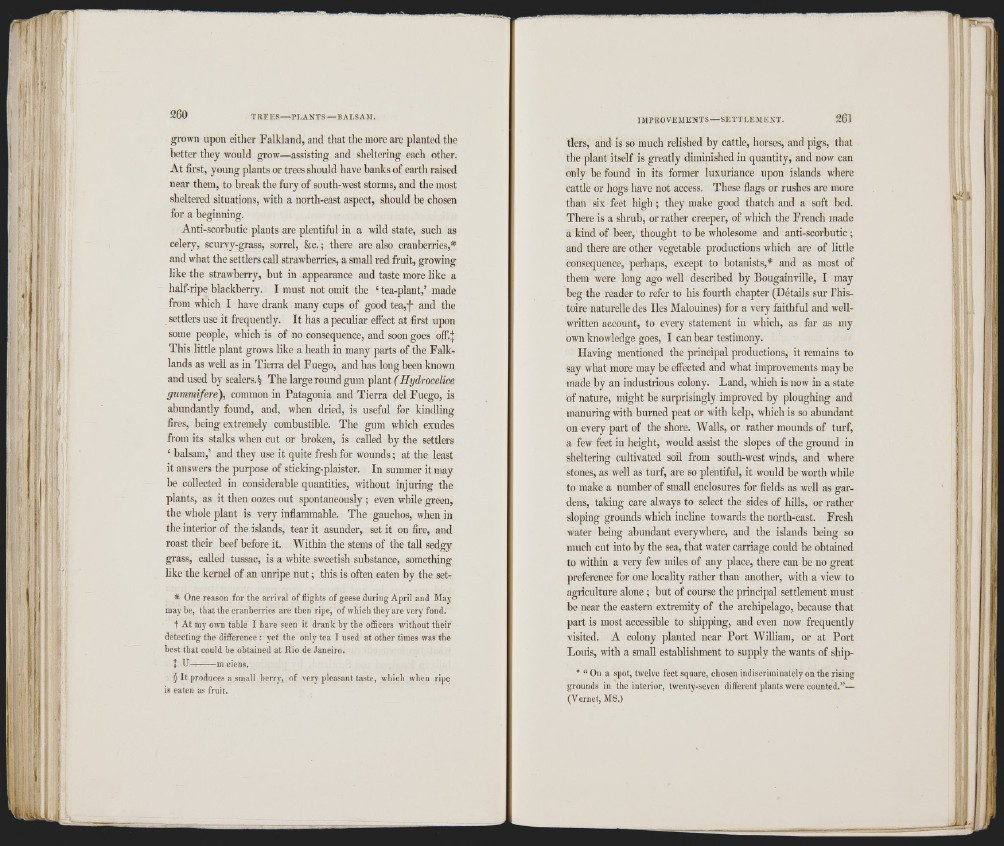
Ii ;. j ,
grown upon either Falkland, and that the more are planted the
better they would grow—assisting and sheltering each other.
At first, young plants or trees should have banks of earth raised
near them, to break the fury of south-west storms, and the most
sheltered situations, with a north-east aspect, should be chosen
for a beginning.
Anti-scorbutic plants are plentiful in a wild state, such as
celery, scurvy-grass, sorrel, &c.; there are also cranberries,*
and what the settlers call strawberries, a small red fruit, growing
like the strawberry, but in appearance and taste more like a
half-ripe blackberry. I must not omit the ‘ tea-plant,’ made
from which I have drank many cups of good tea,-f- and the
settlers use it frequently. I t has a peculiar effect at first upon
some people, which is of no consequence, and soon goes off.|
This little plant grows like a heath in many parts of the Falklands
as well as in Tierra del Fuego, and has long been known
and used by sealers.§ The large round gum plant (Hydrocelice
giimmifere), common in Patagonia and Tierra del Fuego, is
abundantly found, and, when dried, is useful for kindling
fires, being extremely combustible. The gum which exudes
from its stalks when cut or broken, is called by the settlers
‘ balsam,’ and they use it quite fresh for wounds; at the least
it answers the purpose of sticking-plaister. In summer it may
be collected in considerable quantities, without injuring the
plants, as it then oozes out spontaneously ; even while green,
the whole plant is very inflammable. The gauchos, when in
the interior of the islands, tear it asunder, set it on fire, and
roast their beef before it. Within the stems of the tall sedgy
grass, called tussac, is a white sweetish substance, something
hke the kernel of an unripe n u t; this is often eaten by the set-
* One reason for the arrival of flights of geese during April and May
may be, that the cranberries are then ripe, of which they are very fond.
t At my own table I have seen it drank by the officers without their
detecting the difference : yet the only tea I used at other times was the
best that could be obtained at Rio de Janeiro.
+ U--------m ciens.
§ It produces a small berrjq of very pleasant taste, which when ripe
is eaten as fruit.
tiers, and is so much relished by cattle, horses, and pigs, that
the plant itself is greatly diminished in quantity, and now can
only be found in its former luxuriance upon islands where
cattle or hogs have not access. These flags or rushes are more
than six feet high ; they make good thatch and a soft bed.
There is a shrub, or rather creeper, of which the French made
a kind of beer, thought to be wholesome and anti-scorbutic ;
and there are other vegetable productions which are of little
consequence, perhaps, except to botanists,* and as most of
them were long ago well described by Bougainville, I may
beg the reader to refer to his fourth chapter (Détails sur l’histoire
naturelle des Iles Malouines) for a very faithful and well-
written account, to every statement in which, as far as my
own knowledge goes, I can bear testimony.
Having mentioned the principal productions, it remains to
say wbat more may be effected and what improvements may be
made by an industrious colony. Land, which is now in a state
of nature, might be surprisingly improved by ploughing and
manuring with burned peat or with kelp, which is so abundant
on every part of the shore. Walls, or rather mounds of turf,
a few feet in height, would assist the slopes of the ground in
sheltering cultivated soil from south-west winds, and where
stones, as well as turf, are so plentiful, it would be worth while
to make a number of small enclosures for fields as well as gardens,
taking care always to select the sides of hills, or rather
-sloping grounds which incline towards the north-east. Fresh
water being abundant everywhere, and the islands being so
much cut into by the sea, that water carriage could be obtained
to within a very few miles of any place, there can be no great
preference for one locality rather than another, with a view to
agriculture alone ; but of course the principal settlement must
be near the eastern extremity of the archipelago, because that
part is most accessible to shipping, and even now frequently
visited. A colony planted near Port William, or at Port
Louis, with a small establishment to supply the wants of ship-
* “ On a spot, twelve feet square, chosen indiscriminately on the rising“
grounds in the interior, twenty-seven different plants were counted.”—
(Vernet, MS.)
\ ,
i: -
'j! ■',
JJ